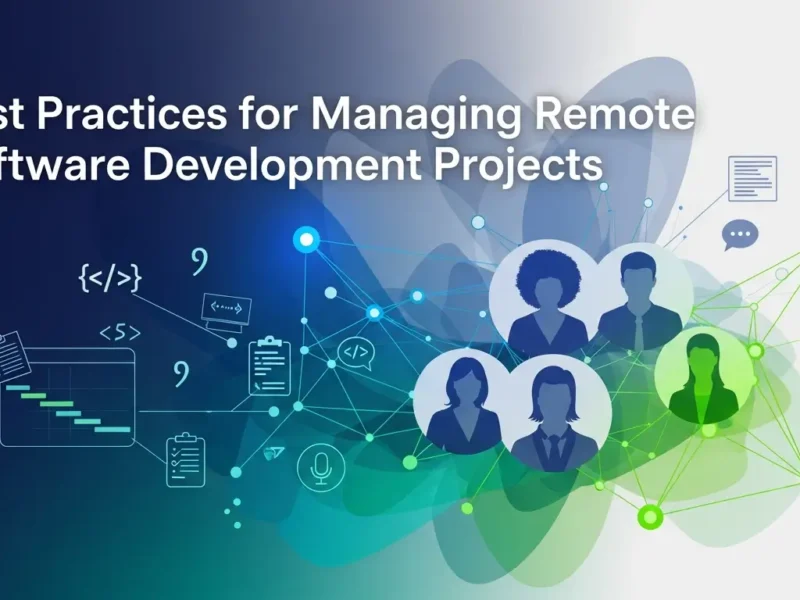In the dynamic world of real estate, managing client relationships, tracking properties, and streamlining transactions are not just important—they’re paramount to success. Yet, many real estate professionals find themselves wrestling with a patchwork of spreadsheets, generic software, and disconnected communication channels. Leads slip through the cracks, essential data remains siloed, and the promise of efficiency feels perpetually out of reach. This common frustration points to a fundamental truth: off-the-shelf CRM solutions rarely fit the intricate, unique demands of the real estate industry.
You need a system that understands the nuances of property listings, the complexities of deal stages, and the long-term nature of client relationships in real estate. This is precisely where custom real estate CRM software development becomes not just a luxury, but a strategic necessity. A bespoke CRM is more than just a tool; it’s the central nervous system of your business, designed to drive unparalleled growth and operational excellence. Choosing expert custom software development services ensures that this critical system is built from the ground up, perfectly aligning with your specific business model and future ambitions.
Why Go Custom? Beyond the Limitations of Generic CRMs
While readily available CRM solutions promise universal applicability, their “one-size-fits-all” approach often translates to a “fits-none-perfectly” reality for real estate. The generic CRM might handle basic contact management, but it stumbles when faced with the specific workflows and data points critical to real estate operations.
Here’s why generic CRMs fall short for your unique real estate workflows:
- Inadequate Data Fields: Real estate requires highly specific data points like property type, square footage, zoning laws, historical pricing, neighborhood demographics, and complex lead sources (e.g., open houses, online portals, referrals). Generic CRMs lack these dedicated fields, forcing cumbersome workarounds or external spreadsheets.
- Rigid Deal Stages: The sales cycle in real estate is multifaceted, extending from initial inquiry, property viewing, offer, negotiation, due diligence, to closing and even post-sale follow-up. Standard CRMs often have overly simplified pipelines that don’t map effectively to these detailed, often lengthy, processes.
- Lack of Property-Centricity: A core limitation is that most generic CRMs are contact-centric, not property-centric. For real estate, the property itself is often the primary asset around which all activities revolve – tracking its status, associated leads, showing history, and marketing efforts.
- Poor Integration with Industry Tools:Real estate professionals rely on MLS listings, property portals (e.g., Zillow, Realtor.com), e-signature platforms, appraisal tools, and local government databases. Generic CRMs struggle to integrate seamlessly with these industry-specific tools, leading to manual data entry and inefficient information transfer.
- Limited Custom Reporting & Analytics:While generic CRMs offer some reporting, they rarely provide the granular, real estate-specific insights needed for strategic decision-making – like agent commission forecasts, lead source ROI by property type, or market trend analysis.
- Scalability Challenges:As your real estate business grows, adding new agents, expanding into new markets, or diversifying into property management exposes the architectural weaknesses of generic systems, leading to performance bottlenecks and costly licensing fees for features you don’t even use.
Bespoke CRM for real estate addresses these pain points by building a system aroundyourspecific needs, optimizingyourworkflows, and integrating withyouressential tools, ensuring true efficiency and competitive advantage.
Key Features of a High-Performing Custom Real Estate CRM
A tailored CRM solution for property management and sales is designed to cover every touchpoint of your real estate business. Here are the core features that define a powerful, custom-built system:
- Lead Management & Nurturing:
- Automated Lead Capture:Seamlessly import leads from your website, property portals, social media, and direct inquiries.
- Intelligent Lead Scoring:Implement custom algorithms to rank leads based on their engagement, property interests, and demographics, ensuring agents focus on high-potential prospects.
- Automated Nurturing Workflows:Trigger personalized email sequences, SMS alerts, and task reminders based on lead behavior, keeping prospects engaged throughout the sales funnel.
- Multi-Channel Integration:Unify communication across email, SMS, phone calls, and even social media within a single platform.
- Property & Listing Management:
- Comprehensive Property Profiles:Centralize all property-related data, including detailed specifications, photos, videos, virtual tours, floor plans, historical data, and owner information.
- MLS & External Listing Site Integration:Automatically sync new listings and updates with MLS and popular real estate portals, eliminating manual entry and ensuring data accuracy.
- Availability & Showing Management:Track property availability, schedule showings, and manage viewing feedback directly within the CRM.
- Customizable Filters & Search:Empower agents and clients to find properties based on highly specific criteria, improving matching efficiency.
- Transaction & Document Management:
- Automated Workflow for Deals:Guide agents through each stage of a transaction (offer, negotiation, inspection, financing, closing) with automated tasks, reminders, and notifications.
- Integrated Document Generation & Management:Create, store, and manage all contracts, agreements, disclosures, and closing documents within the CRM.
- Digital Signing Capabilities:Integrate with e-signature solutions for seamless, secure document signing, accelerating the closing process.
- Compliance & Audit Trails:Maintain detailed records of all interactions and document versions to ensure regulatory compliance and provide clear audit trails.
- Agent & Team Performance Tracking:
- Individual & Team Performance Dashboards:Provide real-time insights into lead conversion rates, sales volume, activity levels, and commission tracking for each agent and the team as a whole.
- Task & Calendar Management:Integrate with agents’ calendars, allowing them to manage appointments, set reminders, and prioritize daily tasks efficiently.
- Commission Management:Automate the calculation and tracking of commissions based on complex structures, reducing administrative overhead.
- Collaborative Tools:Enable seamless communication and task assignment between agents, brokers, and administrative staff.
- Client Portals & Communication Hubs:
- Personalized Client Portals:Offer clients a secure, branded portal where they can view recommended properties, track transaction progress, upload documents, and communicate directly with their agent.
- Automated Client Updates:Configure automatic notifications for clients regarding new listings that match their criteria, price changes, or transaction milestones.
- Feedback & Rating Systems:Collect feedback from clients on property viewings or service quality to continuously improve offerings.
- Advanced Analytics & Reporting:
- Customizable Dashboards:Create tailored dashboards that present key performance indicators (KPIs) relevant to your specific business goals, from sales forecasts to marketing ROI.
- Predictive Insights:Leverage historical data to identify market trends, predict property values, and forecast lead generation or sales outcomes.
- Granular Reporting:Generate detailed reports on any aspect of your operations – agent productivity, marketing campaign effectiveness, regional market performance, or investment property yields.
- Data Visualization:Present complex data in easy-to-understand charts and graphs, facilitating quicker, more informed decision-making.
What to Expect from Real Estate CRM Development
Engaging in real estate CRM development with an expert partner ensures a structured, collaborative process that aligns the final product perfectly with your vision. Here’s a typical roadmap you can expect:
- Discovery & Requirements Gathering: This crucial initial phase involves in-depth consultations to understand your current workflows, pain points, business goals, and specific needs. We’ll identify key stakeholders, define user roles, and outline the core functionalities required. This stage is about translating your business needs into technical specifications, ensuring every feature serves a purpose.
- UI/UX Design for Real Estate Professionals: A great CRM isn’t just functional; it’s intuitive and enjoyable to use. Our design process focuses on creating a user interface (UI) that is clean, logical, and specifically tailored for the fast-paced work of real estate agents and brokers. User experience (UX) is paramount, ensuring workflows are seamless, data input is efficient, and essential information is easily accessible, reducing training time and increasing adoption.
- Backend Development & Integrations: This is where the robust foundation of your bespoke CRM for real estate is built. Our developers craft a scalable, secure, and high-performance backend architecture. Crucially, this stage involves integrating with your existing essential tools – be it MLS systems, popular property listing sites, e-signature platforms, accounting software, or marketing automation tools – ensuring a cohesive digital ecosystem.
- Testing & Deployment: Rigorous testing is performed at every stage of development, covering functionality, security, performance, and usability. We conduct comprehensive quality assurance (QA) checks to identify and resolve any bugs, ensuring the CRM is stable and reliable. Once approved, the software is deployed to your chosen environment, whether cloud-based or on-premise, with minimal disruption to your operations.
- Post-Launch Support & Scalability: Our commitment doesn’t end at deployment. We provide ongoing support, maintenance, and bug fixes to ensure your custom CRM operates smoothly. As your real estate business evolves, we work with you to implement new features, integrate with emerging technologies, and scale the system to accommodate growth, ensuring it remains a long-term asset.
Conclusion
In an increasingly competitive real estate landscape, differentiation is key. Relying on generic, ill-fitting software is no longer sustainable for businesses aiming for significant growth. Investing in custom real estate CRM development provides an unparalleled competitive advantage, allowing you to optimize your unique workflows, provide superior client experiences, empower your team, and make data-driven decisions that propel your business forward.
Imagine a system that perfectly aligns with your vision, grows with your ambition, and consistently delivers the insights you need to stay ahead. That’s the power of a bespoke solution.
Ready to build a CRM that truly fits your business and drives unrivaled growth?
Contact Netclubbed for a free consultation today!Let’s discuss how we can transform your real estate operations with a tailored software solution designed for your success.



